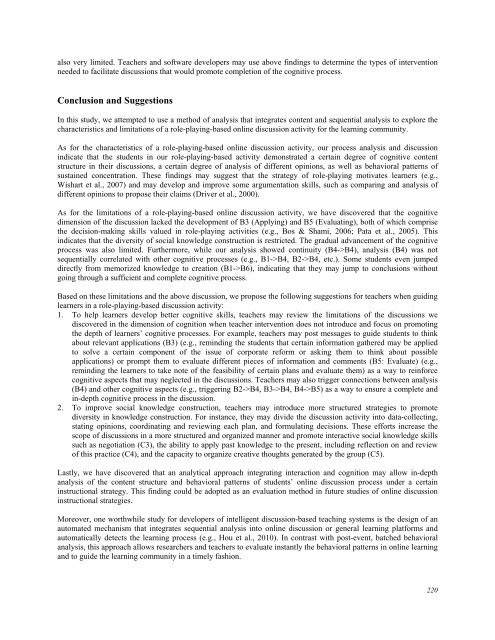January 2012 Volume 15 Number 1 - Educational Technology ...
January 2012 Volume 15 Number 1 - Educational Technology ...
January 2012 Volume 15 Number 1 - Educational Technology ...
You also want an ePaper? Increase the reach of your titles
YUMPU automatically turns print PDFs into web optimized ePapers that Google loves.
also very limited. Teachers and software developers may use above findings to determine the types of intervention<br />
needed to facilitate discussions that would promote completion of the cognitive process.<br />
Conclusion and Suggestions<br />
In this study, we attempted to use a method of analysis that integrates content and sequential analysis to explore the<br />
characteristics and limitations of a role-playing-based online discussion activity for the learning community.<br />
As for the characteristics of a role-playing-based online discussion activity, our process analysis and discussion<br />
indicate that the students in our role-playing-based activity demonstrated a certain degree of cognitive content<br />
structure in their discussions, a certain degree of analysis of different opinions, as well as behavioral patterns of<br />
sustained concentration. These findings may suggest that the strategy of role-playing motivates learners (e.g.,<br />
Wishart et al., 2007) and may develop and improve some argumentation skills, such as comparing and analysis of<br />
different opinions to propose their claims (Driver et al., 2000).<br />
As for the limitations of a role-playing-based online discussion activity, we have discovered that the cognitive<br />
dimension of the discussion lacked the development of B3 (Applying) and B5 (Evaluating), both of which comprise<br />
the decision-making skills valued in role-playing activities (e.g., Bos & Shami, 2006; Pata et al., 2005). This<br />
indicates that the diversity of social knowledge construction is restricted. The gradual advancement of the cognitive<br />
process was also limited. Furthermore, while our analysis showed continuity (B4->B4), analysis (B4) was not<br />
sequentially correlated with other cognitive processes (e.g., B1->B4, B2->B4, etc.). Some students even jumped<br />
directly from memorized knowledge to creation (B1->B6), indicating that they may jump to conclusions without<br />
going through a sufficient and complete cognitive process.<br />
Based on these limitations and the above discussion, we propose the following suggestions for teachers when guiding<br />
learners in a role-playing-based discussion activity:<br />
1. To help learners develop better cognitive skills, teachers may review the limitations of the discussions we<br />
discovered in the dimension of cognition when teacher intervention does not introduce and focus on promoting<br />
the depth of learners’ cognitive processes. For example, teachers may post messages to guide students to think<br />
about relevant applications (B3) (e.g., reminding the students that certain information gathered may be applied<br />
to solve a certain component of the issue of corporate reform or asking them to think about possible<br />
applications) or prompt them to evaluate different pieces of information and comments (B5: Evaluate) (e.g.,<br />
reminding the learners to take note of the feasibility of certain plans and evaluate them) as a way to reinforce<br />
cognitive aspects that may neglected in the discussions. Teachers may also trigger connections between analysis<br />
(B4) and other cognitive aspects (e.g., triggering B2->B4, B3->B4, B4->B5) as a way to ensure a complete and<br />
in-depth cognitive process in the discussion.<br />
2. To improve social knowledge construction, teachers may introduce more structured strategies to promote<br />
diversity in knowledge construction. For instance, they may divide the discussion activity into data-collecting,<br />
stating opinions, coordinating and reviewing each plan, and formulating decisions. These efforts increase the<br />
scope of discussions in a more structured and organized manner and promote interactive social knowledge skills<br />
such as negotiation (C3), the ability to apply past knowledge to the present, including reflection on and review<br />
of this practice (C4), and the capacity to organize creative thoughts generated by the group (C5).<br />
Lastly, we have discovered that an analytical approach integrating interaction and cognition may allow in-depth<br />
analysis of the content structure and behavioral patterns of students’ online discussion process under a certain<br />
instructional strategy. This finding could be adopted as an evaluation method in future studies of online discussion<br />
instructional strategies.<br />
Moreover, one worthwhile study for developers of intelligent discussion-based teaching systems is the design of an<br />
automated mechanism that integrates sequential analysis into online discussion or general learning platforms and<br />
automatically detects the learning process (e.g., Hou et al., 2010). In contrast with post-event, batched behavioral<br />
analysis, this approach allows researchers and teachers to evaluate instantly the behavioral patterns in online learning<br />
and to guide the learning community in a timely fashion.<br />
220

















